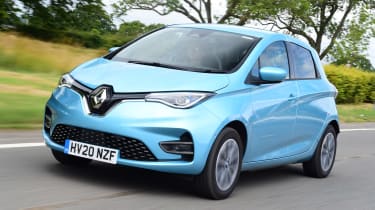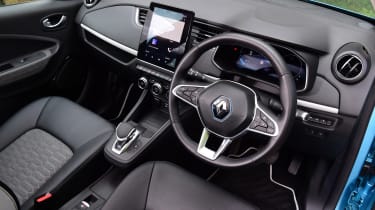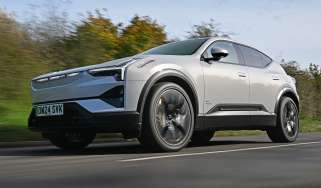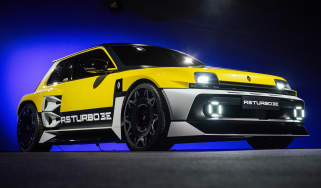Renault ZOE review
The cutesy-looking Renault ZOE remains a solid small electric car pick thanks to its hi-tech cabin and strong range, although it’s missing several important safety and charging features
Pros
- Smart interior with ethical materials
- Loads of equipment
- Long driving range
Cons
- Driving position could be better
- CCS fast charging is optional
- No AEB on lower trims
| Range | Wallbox charge time | Rapid charge time* (where applicable) |
|---|---|---|
| 239 miles | 8hrs 30mins (0-100%, 7.4kW) | 56mins (10-80%, 50kW) |
Renault ZOE verdict
The Renault ZOE is a small electric hatchback that offers stylish looks and a strong electric range – all for an affordable price. However, it’s been around for quite a while now and wrinkles are beginning to show in the bubble-shaped supermini’s otherwise smooth bodywork. It’s a shame CCS fast charging doesn’t come as standard, and the ZOE’s lack of crucial airbags contribute to its poor safety rating. Otherwise though, there’s a lot to like about Renault’s smallest electric car, and while it may not feel as futuristic as some newer rivals, it’s still worth considering for those looking for an affordable, low-emissions city runaround.
Range details, specs and alternatives
Renault has a long history with EVs, providing the chassis for the world’s first production electric car, the Henney Kilowatt, back in the late 1950s. The Renault ZOE made its debut in 2012 as the brand’s first foray into the mainstream electric car market, and one of the world’s first affordable EVs.
Now in its second generation, the ZOE remains a small, electric hatchback that goes head-to-head with newer rivals such as the Fiat 500 EV, MINI Electric, Vauxhall Corsa Electric and DrivingElectric’s Best Urban Electric Car for 2023, the GWM Ora Funky Cat. Starting at around £30,000, the plug-in Renault supermini also looks to steal sales from the likes of electric family hatchbacks such as the cheaper MG4 and Nissan Leaf, as well as the more expensive Volkswagen ID.3 and Kia Niro EV.
Peel away the ZOE’s stylish and bubblelike exterior and you’ll find all versions are powered by a 52kWh battery pack, providing a range of up to 239 miles on a single charge. This is mated to a front-mounted 134bhp motor, getting the ZOE from 0-62mph in 9.5 seconds. Buyers also used to have the option of a cheaper, less-powerful model with 107bhp, but this has since been discontinued.
The Renault ZOE is beginning to show its age and this is perhaps most evident due to the fact that rapid CCS charging does not come as standard; the entry-level Techno model can only make use of a Type 2 charging connector for speeds of up to 22kW when connected to a compatible public (or three-phase home) charger. Top-of-the-range Iconic cars get access to full CCS charging at 50kW, enabling for a 10-80% top-up in just over an hour. While this can be added to entry-level cars for an additional cost, it’s still much slower than the speeds available in rivals, with the Peugeot e-208 able to charge up to twice as fast.
Standard equipment is strong, however. All ZOE models come as standard with full-LED exterior lighting as well as the same 9.3-inch EasyLink touchscreen as the petrol-powered Renault Clio with built-in sat nav, plus Apple CarPlay and Android Auto connectivity. In addition, you get climate control, heated front seats, blind-spot monitoring and a reversing camera. While the ZOE otherwise comes fully-loaded, several crucial airbags are not offered, resulting in a worrying zero-star Euro NCAP safety score.
The only way to distinguish range-topping Iconic cars other than the faster charging speeds, is a larger set of 17-inch wheels (base cars get 16-inch rims), and some gold exterior detailing.
With only two models available, it’s easy to make a recommendation of which to go for; most buyers looking to use the ZOE as a second car will be fine with the entry-level ZOE Techno as this is well-equipped and offers decent range that can easily be topped-up overnight at home. Those looking to use the ZOE on longer journeys should consider stepping up to a model with CCS charging capability; at only around £1,200 more for the fast-charging Techno and a further £800 for the range-topping Iconic, this isn’t a huge step up price-wise and ultimately makes the car much more versatile.





